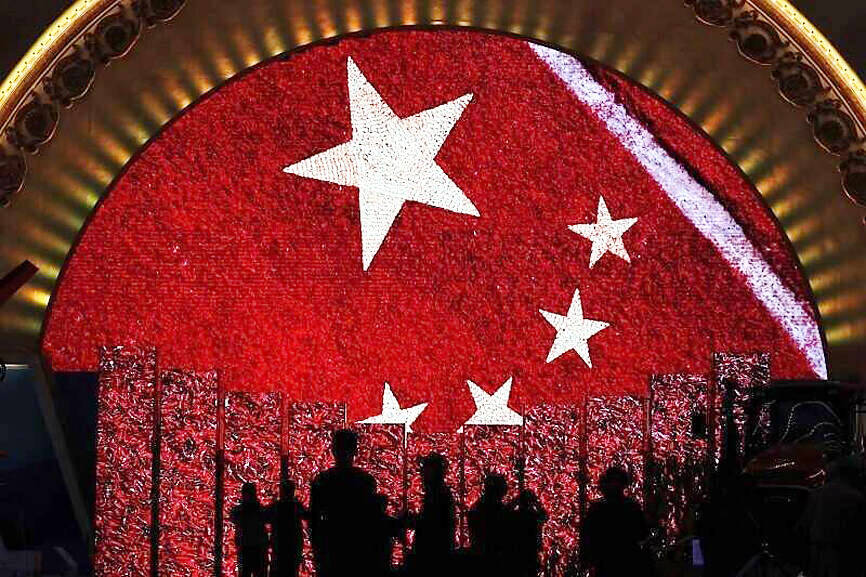Taiwanese entertainers living in China who are found to have contravened cross-strait regulations or collaborated with the Chinese Communist Party (CCP) could be subject to fines, a source said on Sunday.
Several Taiwanese entertainers have posted on the social media platform Sina Weibo saying that Taiwan “must be returned” to China, and sharing news articles from Chinese state media.
In response, the Mainland Affairs Council (MAC) has asked the Ministry of Culture to investigate whether the entertainers had contravened any laws, and asked for them to be questioned upon their return to Taiwan, an official familiar with the matter said.

Photo: AP
To curb repeated incidents of Taiwanese entertainers endorsing the CCP and harming the Republic of China, authorities would investigate and summon those who repost Chinese state media content in support of Chinese military exercises that target Taiwan, they said.
In one such incident during China’s “Joint Sword-2024B” military exercises around Taiwan last year, musician and actress Ouyang Nana (歐陽娜娜) shared on social media a Chinese news article about the drills, writing that “Taiwan has been part of China since ancient times. There is only one China.”
Taiwanese-Canadian singer Angela Chang (張韶涵) shared online a Chinese news article, writing that “national reunification is unstoppable,” while Taiwanese actor Kevin Lin (林瑞陽) posted on social media an image of the exercises, adding: “Defend national sovereignty and maintain national unity.”
After Chinese Minister of Foreign Affairs Wang Yi (王毅) last month referred to Taiwan as “China’s Taiwan Province,” more than 100 Taiwanese celebrities reposted the statement, saying that “Taiwan must return” to China.
Taiwanese entertainers working in China frequently aid CCP propaganda efforts, the official said, speaking on condition of anonymity.
Immigration authorities and other agencies have received numerous complaints regarding such contraventions, prompting the government to take action, they said.
“Evidence would be collected in accordance with the Administrative Procedure Act (行政程序法), and authorities would summon the entertainers to explain themselves. If they fail to appear, they might be fined directly,” they said.
Entertainers found cooperating with the CCP on political or military matters would be fined under Article 33-1 of the Act Governing Relations Between the People of the Taiwan Area and the Mainland Area (臺灣地區與大陸地區人民關係條例). The fine would range from NT$100,000 to NT$500,000, and could be repeatedly imposed, they said.
The Ministry of the Interior would also investigate whether the artists have registered a household residency in China, they said.
“If a Taiwanese artist has obtained a Chinese ID, their Taiwanese citizenship and household registration would be revoked, preventing them from using their Taiwanese identity to assist in CCP propaganda efforts against Taiwan,” they said.

A preclearance service to facilitate entry for people traveling to select airports in Japan would be available from Thursday next week to Feb. 25 at Taiwan Taoyuan International Airport, Taoyuan International Airport Corp (TIAC) said on Tuesday. The service was first made available to Taiwanese travelers throughout the winter vacation of 2024 and during the Lunar New Year holiday. In addition to flights to the Japanese cities of Hakodate, Asahikawa, Akita, Sendai, Niigata, Okayama, Takamatsu, Kumamoto and Kagoshima, the service would be available to travelers to Kobe and Oita. The service can be accessed by passengers of 15 flight routes operated by

Alain Robert, known as the "French Spider-Man," praised Alex Honnold as exceptionally well-prepared after the US climber completed a free solo ascent of Taipei 101 yesterday. Robert said Honnold's ascent of the 508m-tall skyscraper in just more than one-and-a-half hours without using safety ropes or equipment was a remarkable achievement. "This is my life," he said in an interview conducted in French, adding that he liked the feeling of being "on the edge of danger." The 63-year-old Frenchman climbed Taipei 101 using ropes in December 2004, taking about four hours to reach the top. On a one-to-10 scale of difficulty, Robert said Taipei 101

Taiwanese and US defense groups are collaborating to introduce deployable, semi-autonomous manufacturing systems for drones and components in a boost to the nation’s supply chain resilience. Taiwan’s G-Tech Optroelectronics Corp subsidiary GTOC and the US’ Aerkomm Inc on Friday announced an agreement with fellow US-based Firestorm Lab to adopt the latter’s xCell, a technology featuring 3D printers fitted in 6.1m container units. The systems enable aerial platforms and parts to be produced in high volumes from dispersed nodes capable of rapid redeployment, to minimize the risk of enemy strikes and to meet field requirements, they said. Firestorm chief technology officer Ian Muceus said

MORE FALL: An investigation into one of Xi’s key cronies, part of a broader ‘anti-corruption’ drive, indicates that he might have a deep distrust in the military, an expert said China’s latest military purge underscores systemic risks in its shift from collective leadership to sole rule under Chinese President Xi Jinping (習近平), and could disrupt its chain of command and military capabilities, a national security official said yesterday. If decisionmaking within the Chinese Communist Party has become “irrational” under one-man rule, the Taiwan Strait and the regional situation must be approached with extreme caution, given unforeseen risks, they added. The anonymous official made the remarks as China’s Central Military Commission Vice Chairman Zhang Youxia (張又俠) and Joint Staff Department Chief of Staff Liu Zhenli (劉振立) were reportedly being investigated for suspected “serious